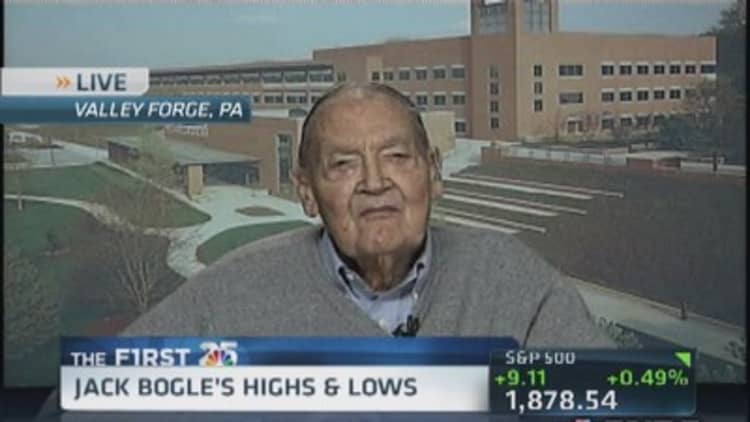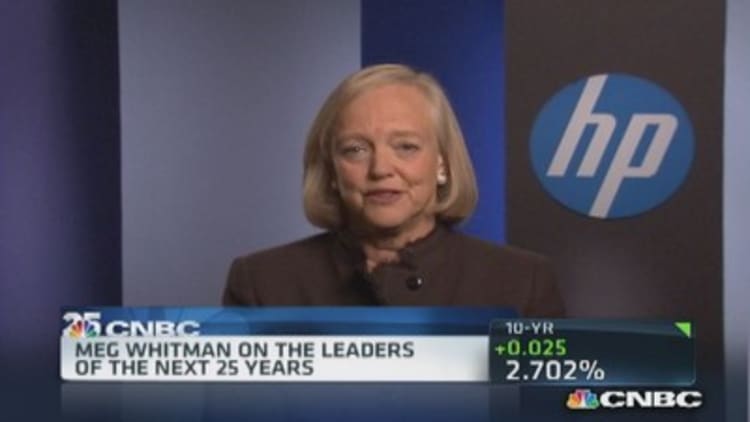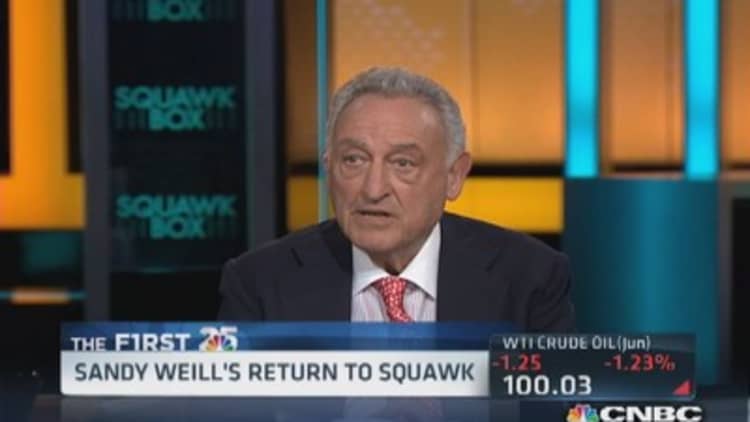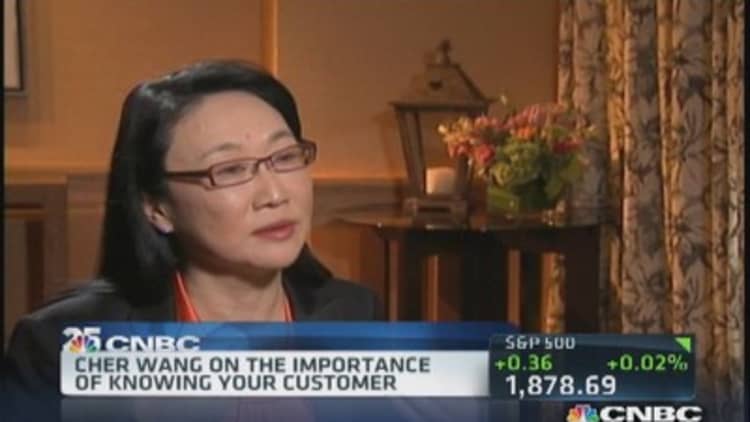Even billionaires and business titans make mistakes.
As the zeroes attached to each error multiply, so does the risk to their fortunes and reputations. One thing the members of CNBC's First 25 list have in common—aside from leaving a lasting impression on the world of business and finance—is how they deal with those mistakes.
Whether it's Google Chairman Eric Schmidt (No. 4 on the list) admitting that the Web giant fell behind on social media or it's the legal troubles of Martha Stewart (No. 24), they treat shortcomings and failures as formative learning experiences rather than roadblocks.
Read MoreBusiness titans reveal secrets of success
For some, those failures were instrumental in the success that put them on the CNBC 25 list in the first place, either through helping them discover an innovative financial product or disrupting a crowded market. Though for others, such as former Citigroup CEO Sanford Weill, the mistakes linger in the form of regret.
Jack Bogle: This mistake cost me my job

Almost 40 years ago, Jack Bogle invented the index mutual fund and became the whipping boy of Wall Street—at least temporarily. It took decades for the funds to become common-place in retail investors' portfolios. By the 1990s, Bogle was an iconic investor. He came in No. 9 on the CNBC 25 list.
Before he founded The Vanguard Group in 1974, Bogle was the president of the Wellington Fund. Around that time, he helped orchestrate a merger with a "Go-Go" investment firm out of Boston.
The fund tanked, and almost took down Wellington with it, Bogle recalled during an interview with CNBC on Tuesday. It cost Bogle his job but opened his eyes to new possibilities at soon-to-be-founded Vanguard.
"You make a big mistake and you pay a big price," Bogle said on CNBC's "Power Lunch." "Who says life isn't fair?"
Read MoreJack Bogle: Why investors shouldn't fear flash trading
Bogle chalked up most of his mistakes to "marketing" and attempts to please the public or chase hot investments. He said most of his ill-fated ideas—specialized portfolios and real estate investments—fall into this category.
The miscues only re-enforced Bogle's trademark investment strategy of low-cost mutual funds that track the returns of benchmark stock market indexes. You can't beat simple math, Bogle said.
"What I got right was not only the index fund, which was the product of a simple mind," Bogle said. "If I was some kind of genius I would have thought I could beat the market all the time and been a big quant or something, but I don't have the talent for that. ...
"So I did the right things by my standards and by the simple math of markets—gross return on the markets plus cost equals net return. That's a formula that's good forever."
Whitman: How eBay missed a huge opportunity

In 1999, Meg Whitman had been CEO of eBay for all of one year. Then the online auction site expanded so fast that explosive user growth crashed the fledgling company's website.
The company had to repair the site, Whitman recalled, causing eBay to miss an important window into what was the second-biggest Internet market at the time: Japan.
Read MoreHP's Meg Whitman: One of my 'big failures' at eBay
Before the website crashed, Whitman had an inkling that it needed an overhaul to handle the flood of new users, Whitman, now CEO of Hewlett-Packard, told CNBC this week.
"It just taught me—follow your intuition," Whitman said in an interview on "Squawk on the Street." "I had a sense that the technology underpinning eBay was not going to help us scale where we needed to. That miss of eBay-Japan is one of the big failures of my time at eBay."
Her second failure? Just the California gubernatorial race in 2010 on which she spent $144 million of her own money. She lost to her opponent, Democrat Jerry Brown. Still, Whitman said the unsuccessful campaign made her a better communicator.
"What I learned was it's not the facts and figures," Whitman said. "It's not the left brain. It is the stories you tell to communicate the vision that you're trying to get the organization to rally around."
Whitman was named No. 18 on CNBC's First 25 list.
Jamie Dimon breakup one of my big mistakes: Weill

Sometimes failures become personal.
Former Citigroup CEO Sanford Weill talked about his two biggest mistakes to CNBC on Wednesday, one of them his unresolved conflict with JPMorgan boss Jamie Dimon. Weill fired Dimon shortly after the Citicorp and Travelers Group merger in 1998.
The move ended a 15-year business partnership with Dimon.
"I wish Jamie and I had been able to work out our issues and that it didn't have to end up in a breakup, because it was a very good relationship," Weill said Wednesday on "Squawk Box."
Jamie Dimon breakup one of my big mistakes: Weill
With Dimon at Citigroup, Weill oversaw what became the first-ever financial supermarket. He cobbled together a $698 billion empire that served as a precursor to the "too big to fail" banks of the 2008 financial crisis.
Despite having countless billions under his control, it was personal relationships that Weill counted at his biggest shortcomings as CEO. He also told CNBC he never should have picked Charles Prince to succeed him at Citi.
Before resigning amid the peak of the subprime mortgage crisis, Prince saw several high-level executives leave the bank under his watch.
Weill was named No. 21 on the CNBC 25 list.
The botched deal that taught me a lesson: Wang

Before HTC CEO Cher Wang had become one of Asia's richest women and one of the tech world's biggest players, she was lugging around 40-pound computers to potential clients in the 1980s.
One client ended up teaching her an important life lesson: Always know your customer, Wang recalled in a CNBC interview. In this case, the client couldn't pay for a big order and defaulted on hundreds of thousands of dollars, Wang recalled.
"To understand your customer, to visit them, to really understand what they need is very important," Wang said on an interview that aired Wednesday on "Squawk on the Street." "This type of attitude, this customer service, should come from your heart."
Read MoreCher Wang: HTC's big communication problem
Like the other business titans on the CNBC list, Wang treated the failure as a learning experience. It was during that job, hauling around heavy computer equipment, that she envisioned a computer that could fit in her hand.
Years later, Wang's company made one in every six smartphones in the U.S. alone at one point. The early smartphone maker has since lost market share to Apple and Samsung, but Wang is using her life lessons to orchestrate a turnaround at HTC.
Wang was named 22nd on the CNBC 25 list.
—By CNBC's Jeff Morganteen. CNBC's Matthew J. Belvedere contributed to this story.





